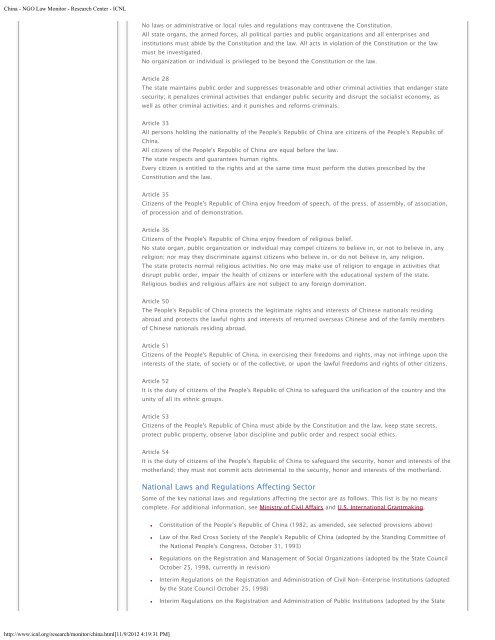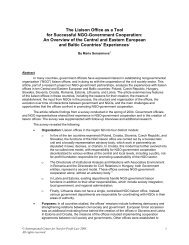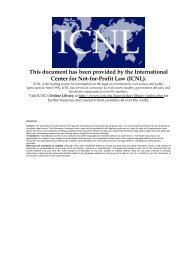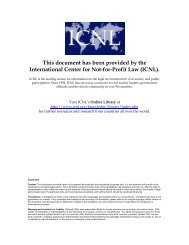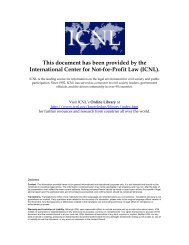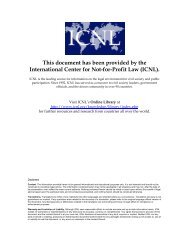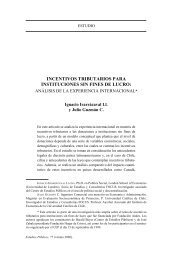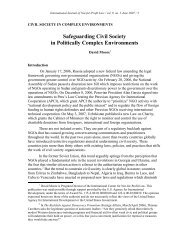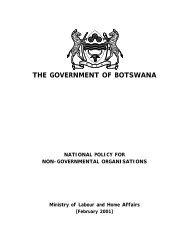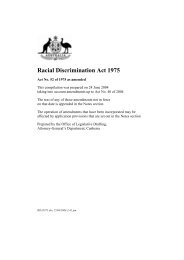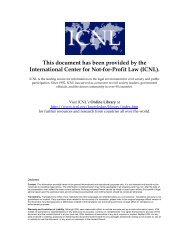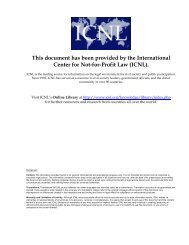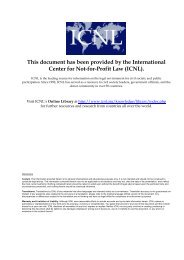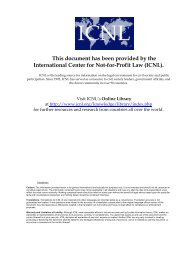NGO Law Monitor: China RESEARCH CENTER - The International ...
NGO Law Monitor: China RESEARCH CENTER - The International ...
NGO Law Monitor: China RESEARCH CENTER - The International ...
You also want an ePaper? Increase the reach of your titles
YUMPU automatically turns print PDFs into web optimized ePapers that Google loves.
<strong>China</strong> - <strong>NGO</strong> <strong>Law</strong> <strong>Monitor</strong> - Research Center - ICNL<br />
http://www.icnl.org/research/monitor/china.html[11/9/2012 4:19:31 PM]<br />
No laws or administrative or local rules and regulations may contravene the Constitution.<br />
All state organs, the armed forces, all political parties and public organizations and all enterprises and<br />
institutions must abide by the Constitution and the law. All acts in violation of the Constitution or the law<br />
must be investigated.<br />
No organization or individual is privileged to be beyond the Constitution or the law.<br />
Article 28<br />
<strong>The</strong> state maintains public order and suppresses treasonable and other criminal activities that endanger state<br />
security; it penalizes criminal activities that endanger public security and disrupt the socialist economy, as<br />
well as other criminal activities; and it punishes and reforms criminals.<br />
Article 33<br />
All persons holding the nationality of the People's Republic of <strong>China</strong> are citizens of the People's Republic of<br />
<strong>China</strong>.<br />
All citizens of the People's Republic of <strong>China</strong> are equal before the law.<br />
<strong>The</strong> state respects and guarantees human rights.<br />
Every citizen is entitled to the rights and at the same time must perform the duties prescribed by the<br />
Constitution and the law.<br />
Article 35<br />
Citizens of the People's Republic of <strong>China</strong> enjoy freedom of speech, of the press, of assembly, of association,<br />
of procession and of demonstration.<br />
Article 36<br />
Citizens of the People's Republic of <strong>China</strong> enjoy freedom of religious belief.<br />
No state organ, public organization or individual may compel citizens to believe in, or not to believe in, any<br />
religion; nor may they discriminate against citizens who believe in, or do not believe in, any religion.<br />
<strong>The</strong> state protects normal religious activities. No one may make use of religion to engage in activities that<br />
disrupt public order, impair the health of citizens or interfere with the educational system of the state.<br />
Religious bodies and religious affairs are not subject to any foreign domination.<br />
Article 50<br />
<strong>The</strong> People's Republic of <strong>China</strong> protects the legitimate rights and interests of Chinese nationals residing<br />
abroad and protects the lawful rights and interests of returned overseas Chinese and of the family members<br />
of Chinese nationals residing abroad.<br />
Article 51<br />
Citizens of the People's Republic of <strong>China</strong>, in exercising their freedoms and rights, may not infringe upon the<br />
interests of the state, of society or of the collective, or upon the lawful freedoms and rights of other citizens.<br />
Article 52<br />
It is the duty of citizens of the People's Republic of <strong>China</strong> to safeguard the unification of the country and the<br />
unity of all its ethnic groups.<br />
Article 53<br />
Citizens of the People's Republic of <strong>China</strong> must abide by the Constitution and the law, keep state secrets,<br />
protect public property, observe labor discipline and public order and respect social ethics.<br />
Article 54<br />
It is the duty of citizens of the People's Republic of <strong>China</strong> to safeguard the security, honor and interests of the<br />
motherland; they must not commit acts detrimental to the security, honor and interests of the motherland.<br />
National <strong>Law</strong>s and Regulations Affecting Sector<br />
Some of the key national laws and regulations affecting the sector are as follows. This list is by no means<br />
complete. For additional information, see Ministry of Civil Affairs and U.S. <strong>International</strong> Grantmaking.<br />
Constitution of the People’s Republic of <strong>China</strong> (1982, as amended, see selected provisions above)<br />
<strong>Law</strong> of the Red Cross Society of the People's Republic of <strong>China</strong> (adopted by the Standing Committee of<br />
the National People's Congress, October 31, 1993)<br />
Regulations on the Registration and Management of Social Organizations (adopted by the State Council<br />
October 25, 1998, currently in revision)<br />
Interim Regulations on the Registration and Administration of Civil Non-Enterprise Institutions (adopted<br />
by the State Council October 25, 1998)<br />
Interim Regulations on the Registration and Administration of Public Institutions (adopted by the State


